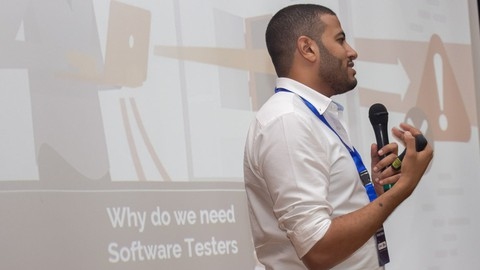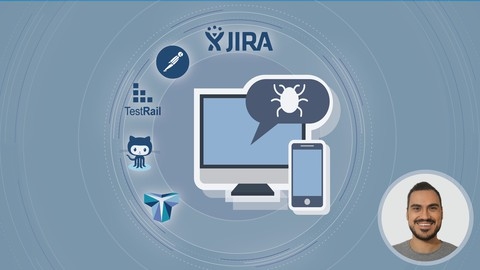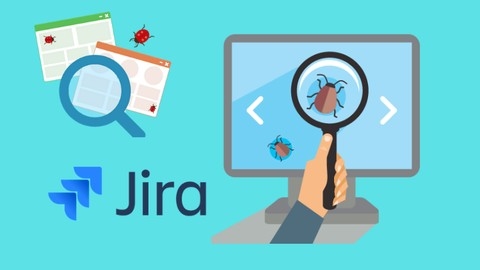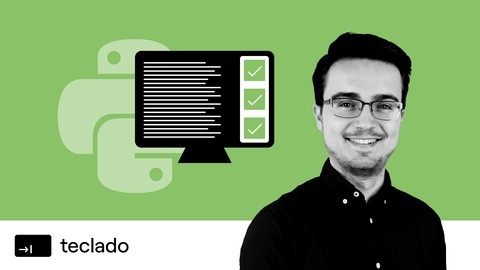Software testing is a critical part of the software development lifecycle, ensuring that applications are reliable, functional, and meet user expectations.
As a software tester, you play a crucial role in identifying bugs, improving software quality, and ultimately delivering a seamless user experience.
Learning software testing can open doors to a rewarding career in a rapidly growing field, where your skills will be in high demand.
With the increasing importance of software quality, it’s no surprise that many aspiring testers are seeking comprehensive training.
However, navigating the vast landscape of online courses can be overwhelming.
You’re looking for a course that not only covers the fundamentals but also provides hands-on experience and practical skills that you can apply in real-world scenarios.
You want a course that equips you with the knowledge and confidence to excel in this exciting field.
After carefully reviewing numerous options, we’ve identified The Complete 2024 Software Testing Bootcamp as the best overall software testing course on Udemy.
This comprehensive bootcamp provides a solid foundation in software testing principles, covering everything from test planning and execution to bug reporting and automation.
With its emphasis on real-world skills and practical exercises, this course prepares you for a successful career in software testing.
While The Complete 2024 Software Testing Bootcamp is our top recommendation, we understand that you might be looking for a course that’s tailored to your specific needs and learning style.
That’s why we’ve compiled a list of other excellent software testing courses on Udemy, each with its own unique strengths and focus areas.
Keep reading to discover the perfect course to launch your software testing journey.
The Complete 2024 Software Testing Bootcamp
This comprehensive bootcamp is a powerful tool for anyone looking to break into the world of software testing.
You’ll start with the foundational concepts, learning the difference between validation and verification, understanding the test process, and exploring various testing types.
It’s like building the foundation of a house before you start adding walls and a roof.
The course then guides you through practical techniques like creating test scenarios and cases, using real-world tools like Trello and Zephyr Scale.
You’ll learn how to write clear, concise test cases and track your progress in a professional manner.
Imagine being able to create a test case for Facebook’s sign-up process, ensuring it works flawlessly for every new user!
One of the most valuable aspects of this bootcamp is its emphasis on real-world skills.
You’ll learn how to report bugs using industry-standard tools like Jira and Azure DevOps, as well as how to use JIRA for Agile testing, a crucial skill for any software tester in today’s development environment.
It’s like learning the language spoken in every software development team.
The course further deepens your expertise with advanced modules on mobile testing, API testing, and performance testing.
Think of it as adding sophisticated tools to your tester’s toolbox, making you a true software testing expert.
You’ll even dive into test automation with Playwright, a powerful framework that allows you to write scripts that test software automatically, saving you time and effort.
Beyond technical skills, this bootcamp also equips you for your career journey.
You’ll learn how to write a professional resume, highlighting your testing abilities, and even how to prepare for industry certifications like the ISTQB Agile Certified Tester, giving you a competitive edge in the job market.
It’s like receiving a professional stamp of approval, signaling your expertise to potential employers.
MasterClass Software Testing with Jira & Agile -Be a QA Lead
This course provides a comprehensive overview of software testing with a focus on using Jira and Agile methodologies.
You will learn about the role of a QA in an Agile Scrum project, working with real-world examples in Jira.
The course starts by introducing you to the Agile Scrum process and how to set up a project in Jira.
You will learn about creating epics, user stories, components, and releases.
Additionally, you’ll understand the importance of backlog refinement meetings and defining acceptance criteria.
Moving forward, you will explore the concept of sprints, Scrum boards, and workflows in Jira.
The course covers creating bugs and analyzing sprint reports.
It also highlights the significance of retrospectives and Kanban boards in Agile practices.
To enhance your testing skills, the course delves into designing test cases based on project architecture and API-driven backends.
You will learn different types of testing involved in a single scenario and how to think out of the box when given a requirement.
The course introduces you to the Xray plugin in Jira, where you will learn to create test cases, preconditions, test sets, and test plans.
You will also understand the importance of test execution and its link with test plans.
Furthermore, you will gain insights into the Software Testing Life Cycle, including test plan preparation, test case development, test environments, requirement traceability matrix, and test closure activities.
The course covers the defect life cycle in depth, teaching you how to create defects, understand severity and priority, verify app server logs, and retest defects effectively.
You will also learn about various types of testing, such as regression testing, smoke/sanity testing, integration testing, component testing, verification and validation, load testing, and stress testing.
The course distinguishes between functional and non-functional requirements testing and explores the differences between black-box and white-box testing.
Additionally, you will go through an end-to-end testing of an ecommerce application using the Bugzilla tool, where you will create test cases, execute them, and log bugs.
The course also includes a section on top QA behavioral interview questions and a bonus lecture on Unix material for beginners.
Optionally, you can learn SQL queries using MySQL, covering topics like creating databases, tables, inserting and retrieving records, logical operators, regular expressions, and wildcards.
Software Testing Masterclass (2024) - From Novice to Expert
This course provides a comprehensive overview of software testing, covering everything from the basics to advanced concepts and tools.
You’ll start by learning the fundamentals, including the role of testing in software development, the software development life cycle, testing activities, bug reporting, and test case creation.
The course then dives into advanced testing techniques like equivalence partitioning, boundary value analysis, decision tables, state transition testing, use case testing, negative testing, smoke testing, sanity testing, regression testing, risk-based testing, and experienced-based testing.
You’ll also learn about static and dynamic testing, test planning and estimation, and development and testing environments.
To help you gain hands-on experience, the course includes tutorials on creating mind maps and test cases, as well as sections dedicated to backend testing, API testing with Postman, web application testing, and mobile app testing.
You’ll work with tools like Jira for bug reporting, GitHub for version control, Confluence for documentation, TestMonitor and TestRail for test management, Miro for collaboration, and Charles Proxy for debugging.
The course even covers SQL for database testing, providing you with a valuable skill set for testing data-driven applications.
Additionally, you’ll learn about freelancing opportunities in software testing, allowing you to start earning money immediately.
For those seeking a deeper understanding, the course explores various process management methodologies like Waterfall, V-Model, and Agile, as well as specialized testing areas like localization, accessibility, usability, and A/B testing.
You’ll also get insights into test automation.
To prepare you for job interviews, the course includes sections on creating a great software tester resume and practicing common interview questions.
The advanced API testing with Postman section covers topics like path and query variables, global and environment variables, writing Postman tests, JSON parsing, dynamic variables, advanced testing techniques, and running tests with the Collection Runner.
Throughout the course, you’ll have access to valuable resources like software testing newsletters, blogs by industry experts like Michael Bolton, James Bach, Katrina the Tester, Ajay, Anne-Marie Charrett, Steve Smith, and Angie Jones, as well as a student community for collaboration and support.
Learn Manual Software Testing + Agile with Jira Tool
The course starts by introducing you to software testing concepts like SDLC, verification vs validation, static and dynamic testing methodologies, testing levels, and types like GUI, usability, functional, and non-functional testing.
You’ll also learn testing terminology and design techniques.
Next, you’ll dive into the software testing life cycle, covering phases like planning, design, execution, and defect reporting.
This part is crucial as you’ll apply these concepts to a real e-commerce website project.
You’ll create test plans, scenarios, cases, a traceability matrix, set up the test environment, execute tests, and report defects.
The course then covers the agile testing process, which is becoming increasingly important.
You’ll learn agile terminology and how to use the popular Jira tool for project and test management.
With Jira, you’ll create projects, backlogs, epics, user stories, sprints, and bugs.
The Zephyr plugin will teach you test case creation, execution, importing, creating test cycles, and generating reports.
Business Analyst: Software Testing Processes & Techniques
You’ll delve into the fundamental concepts of verification and validation, understand the critical goals of testing, and learn how to strategically implement testing throughout the software development lifecycle.
The course goes beyond theory by equipping you with practical skills.
You’ll master the creation and management of essential testing documentation, including quality plans, test workbooks, test cases, and test scenarios.
This hands-on approach extends to defect management, where you’ll gain proficiency in utilizing both Excel and SharePoint for efficient tracking and resolution of issues.
The course concludes with a realistic final activity that simulates a real-world testing project, allowing you to apply your newly acquired skills to a practical scenario.
Automated Software Testing with Python
You’ll start with the fundamentals of Python, learning about variables, data structures, functions, and object-oriented programming.
The curriculum is designed to be hands-on, with coding exercises throughout, so you’ll gain practical skills alongside the theoretical knowledge.
As you progress, you’ll dive into the world of testing, starting with unit testing and moving on to integration and system tests.
You’ll learn about test-driven development (TDD), a key practice for building reliable software.
Popular testing frameworks like PyCharm are used throughout the course, giving you practical experience with industry-standard tools.
The course further delves into testing web applications using Flask, focusing on REST API testing.
You’ll learn about integration testing strategies and how to effectively test your API endpoints.
You’ll also gain experience with tools like Postman and Newman for manual and automated API testing, expanding your skillset beyond Python-based testing.
Beyond the core concepts, you’ll explore advanced topics like continuous integration with Travis CI and acceptance testing with Selenium.
This prepares you for real-world scenarios, allowing you to automate testing pipelines, integrate your code with GitHub, and perform browser-based acceptance testing with Selenium.
Software Testing: Get A Tech Job in Software Testing 2024
This course equips you with the skills needed to launch a career in software testing.
You’ll start by learning the fundamentals of software testing, including what it is and the role of a tester within a technology organization.
The course covers various methodologies used in software development, such as the Software Development Life Cycle (SDLC), Waterfall, and Agile.
You’ll dive into the Software Testing Life Cycle (STLC) and learn how to write test cases through hands-on exercises.
Different types of testing are explored, including manual versus automation, as well as black box and white box testing.
This knowledge will help you understand the testing process from multiple angles.
One unique aspect of the course is its focus on earning money as a freelance tester.
You’ll learn about online websites where you can find freelance testing gigs or even remote testing jobs.
This practical approach can help you gain real-world experience while earning an income.
The course also covers the importance of identifying and reporting bugs, including the use of bug tracking tools.
As you progress, you’ll learn how to craft an effective resume and search for software testing jobs.
Interview preparation is a crucial component, with guidance on how to ace software testing interviews.
Additionally, the course provides valuable materials worth money, potentially opening up money-making opportunities in the field of software QA testing.
Manual Software Testing: Complete Course with Practical Labs
You’ll start by learning the fundamentals of software testing, including its importance, key concepts like static and dynamic testing, quality control, quality assurance, testing terminologies, types of testing, and testing principles.
The course provides a solid foundation by explaining what manual testing is, how it differs from automated testing, the tools used, and how you can learn it online.
One of the standout features of this course is its practical approach.
You’ll learn how to write industry-standard test cases for various applications, including web pages, mobile apps, and desktop software.
The instructor guides you through real-world examples, teaching you to consider assumptions, test criteria, steps, expected results, and actual results.
The course also introduces you to popular project management tools like Trello, Bugzilla, and Jira.
You’ll learn how to create accounts, log bugs, and work with these tools effectively.
Additionally, you’ll explore static review techniques and automation tools like Postman for API testing.
Interestingly, the course covers the Agile methodology, its 12 principles, and practical exercises, ensuring you’re well-versed in this widely adopted approach.
It also includes a section on top manual testing interview questions and answers, preparing you for job interviews.
Furthermore, you’ll gain insights into project planning, time management, resource management, budget management, and best practices for project management.
The course even touches upon the ISTQB certification, its eligibility criteria, syllabus, and levels, providing a pathway for professional growth.
As a bonus, the course offers a free section on OpenAI and ChatGPT, exploring their applications, features, and potential in manual software testing.
You’ll learn how to leverage AI for tasks like test case generation, test data preparation, and defect reporting.
Throughout the course, you’ll find quizzes and multiple-choice questions to reinforce your understanding of the key concepts.








